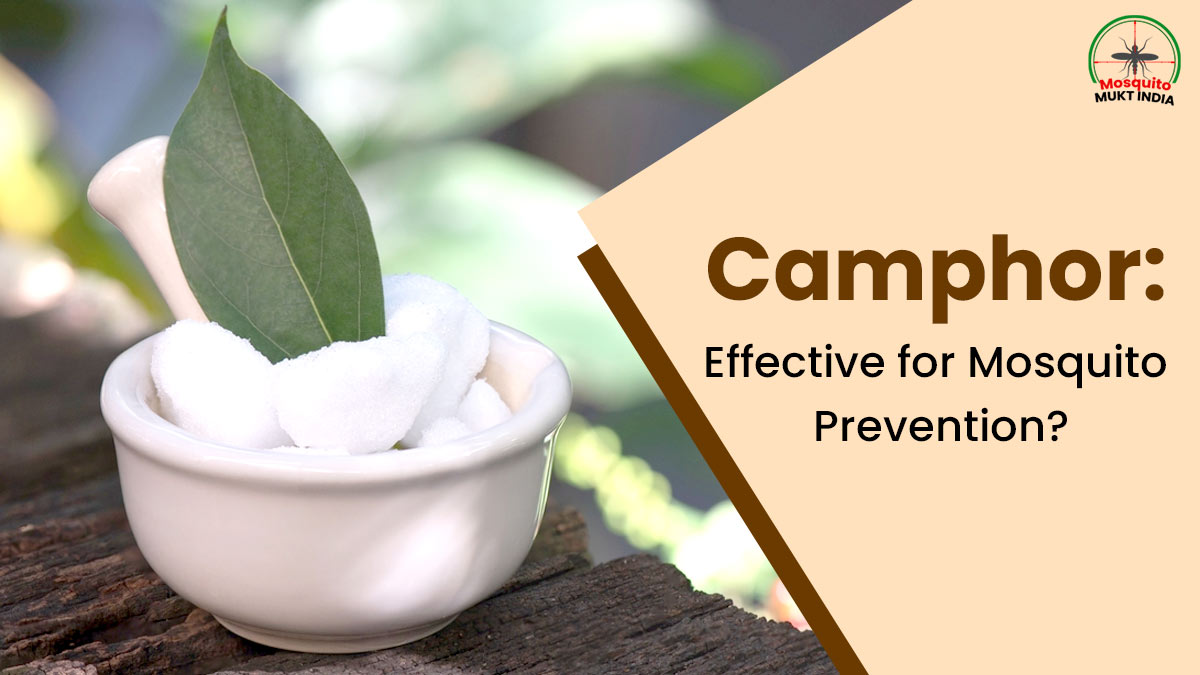
Mosquitoes are everywhere, especially during monsoons, when the climate and environmental conditions become ideal for their breeding. The accumulation of stagnant water from frequent rains, increased humidity, and warm temperatures all contribute to creating ideal conditions for mosquitoes to thrive. However, it’s crucial to continuously work on preventing mosquito breeding and bites. This involves not only maintaining sanitation and hygiene but also using home remedies that can help repel mosquitoes and keep them at bay.
Table of Content:-
As a part of OnlyMyHealth’s Mosquito-Mukt India campaign for World Mosquito Day 2024, here’s a detailed guide to the natural remedies that can help prevent mosquitoes from buzzing around you. Not just that, we take a deep dive into whether or not camphor, a colourless crystalline powder, is an effective repellent.
Also Read: Mosquito Season Is Back, Try These 7 Home Remedies To Prevent Bites
Home Remedies That Help Repel Mosquitoes

Mosquito-prevention strategies are simple and effective. This includes home remedies that often help repel and deter these tiny monsters.
According to the US Centers for Disease Control and Prevention (CDC), Environmental Protection Agency (EPA)-registered insect repellents with ingredients like DEET, picaridin, the oil of lemon eucalyptus, and undecanone can help keep mosquitoes at bay.
In an interaction with us, Dr Divya Gopal, Consultant - Internal Medicine, Sir HN Reliance Hospital, Mumbai, shares that while there is no 'cure all' strategy, one can opt for mosquito repellent plants like citronella, lemon eucalyptus, lavender, and catnip. These can also be used in the form of essential oils and can be diluted and applied to the skin.
Moreover, using mosquito nets over beds, strollers, or outdoor dining areas and eliminating stagnant water sources near your home can provide protection against mosquitoes.
Is Camphor Really Effective Against Mosquitoes?

In addition to the natural remedies listed above, camphor also has some mosquito-repelling properties, says Dr Gopal, attributing it to its active component called borneol. This compound has a strong odour that many insects, including mosquitoes, find unpleasant, she adds.
A very old 1995 study published in the Indian Journal of Malariology found that camphor oil showed some repellent action against mosquitoes. While it was effective against Anopheles culicifacies, its efficacy against Culex quinquefasciatus was lower compared to essential oils like lemongrass and citronella, the research noted.
Dr Gopal says that while camphor is considered a decent natural mosquito repellent, its effectiveness can vary. Additionally, she notes that other natural repellents, like citronella, lemon eucalyptus oil, and DEET-free products, often have more scientific evidence supporting their efficacy.
Also Read: Mosquito-Mukt India: How To Protect Your Babies From Mosquito Bites
How To Use Camphor Safely

Here are some ways you can use camphor safely and effectively:
Camphor balls: Place camphor balls in strategic locations like closets, drawers, or near windows.
Camphor oil: Dilute camphor oil with a carrier oil (like coconut or olive oil) and apply it to exposed skin. Always do a patch test before a full application.
Camphor candles: Burning camphor candles can release the repellent fumes into the air.
According to Dr Gopal, the duration of camphor's effect can vary depending on factors like air circulation, temperature, and the camphor product's strength. Generally, the effect may last a few hours.
Safety Measures To Follow
Be cautious of certain things before using camphor for mosquito prevention:
- Camphor is flammable. Handle it with care, especially when using camphor candles.
- Camphor can be toxic if ingested. Keep it out of the reach of children and pets.
- Some people might experience skin irritation from applying camphor oil directly to the skin. Always do a patch test first.
- Prolonged exposure to camphor fumes can cause headaches, dizziness, or nausea. Ensure good ventilation when using camphor products.
Dr Gopal says that while camphor can be a natural option, it might not provide the same level of protection as commercial insect repellents.
“For areas with high mosquito populations or during outbreaks of mosquito-borne diseases, using EPA-registered repellents might be more effective,” she adds, concluding that consulting with a healthcare professional is crucial if you have any concerns or allergies.
Also watch this video
How we keep this article up to date:
We work with experts and keep a close eye on the latest in health and wellness. Whenever there is a new research or helpful information, we update our articles with accurate and useful advice.
Current Version